#false hero
Explore tagged Tumblr posts
Text


I dub him "Lonk"
Him and Aoba can smooch.
29 notes
·
View notes
Text

“I feel no responsibility to those comrades who’ve lost their lives in my service. They chose to fight those battles, just as you chose, just as I… just as I have chosen this. But there is one thing I can do for them—for the dead. It is to win, and keep winning until I attain my dream. A dream they clung to and risked their lives for. I can’t just step over the bones of the dead in order to realise it. My dream is already smeared with blood. I don’t regret; I don’t feel guilty. But I’d rather sacrifice myself than watch any more innocent children die in the name of my dream.”
— Griffith from Berserk

In my view, Griffith embodies a disturbing blend of unhealthy obsession, Machiavellian cunning, moral detachment, a fractured sense of responsibility, delusion, and false heroism, each aspect interwoven with a chilling elegance.
His unhealthy obsession is clear in his relentless pursuit of his dream, regardless of the cost. When he states that he doesn’t feel responsible for the deaths of his comrades because they “chose” to fight, it highlights his singular focus on his goal, disregarding the human cost. His priority is his vision, and he reduces the sacrifices of others to mere choices rather than recognizing them as genuine acts of selflessness. Yet, despite this rationalisation, he still feels a sense of guilt. His obsession blinds him to the true cost of his ambition, allowing him to justify the loss of life while still struggling with internal conflict.
Machiavellianism is reflected in Griffith’s cold pragmatism. The statement “they chose to fight those battles” underscores his manipulative mindset—he views those around him as pawns who make decisions for themselves. His detached attitude toward their sacrifices reveals his willingness to justify their deaths as a means to an end, characteristic of Machiavellian behavior. Griffith sees people as tools in his grand plan, willing to use them without any emotional attachment or care for their fate. Yet, beneath this detached exterior, he is trapped in his own internal contradictions, experiencing deep guilt over the consequences of his actions.
By claiming, “I feel no responsibility…” one might assume that Griffith is emotionally disengaged from the suffering of others. However, this doesn’t reflect a lack of guilt or regret over the sacrifices of his comrades. Instead, he rationalises their deaths as choices they made, distancing himself from any moral burden. Despite his attempts to distance himself emotionally and justify his actions, he still grapples with guilt. He frequently reflects on the people who have died because of his dream, blaming both himself and his ambition inwardly, while outwardly justifying his actions. This creates an internal dilemma that tears at his psyche.
The following lines further reveal his breakdown through a false sense of responsibility: “But there is one thing I can do for them—for the dead. It is to win, and keep winning until I attain my dream. A dream they clung to and risked their lives for.” Here, Griffith imposes a sense of responsibility that is partially delusional. He convinces himself that the best way to honor the dead is by achieving the dream they “clung to.” However, this sense of responsibility isn’t genuine; it’s a mental construct meant to rationalise his obsession. The weight of this perceived duty serves as psychological justification for continuing to sacrifice others. It’s not true selfless responsibility, but a coping mechanism that allows him to maintain his focus on his goal while masking the emotional turmoil that accompanies it.
Griffith is deluded into believing that the end justifies the means. He says, “I can’t just step over the bones of the dead in order to realise it,” suggesting that he retains some moral boundary. However, his insistence that he must fulfill the dream “for the dead” is itself a delusion, because it enables him to overlook the horrific consequences of his actions while still rationalising them as necessary for the greater good. He convinces himself that his dream will somehow redeem the sacrifices made in its name, even as he continues down a path paved with violence and betrayal.
Finally, Griffith’s false heroism is evident in his belief that his pursuit of his dream is not only justified but noble. The line, “My dream is already smeared with blood,” reflects his internal conflict but also his refusal to turn back. By stating that he would rather sacrifice himself than watch innocent children die for his dream, he presents himself as someone burdened with a higher moral calling—sacrificing others for the “greater good.”
This is the essence of false heroism: Griffith sees himself as a hero because he believes he is making these sacrifices for a noble cause, when, in reality, his actions are self-serving and driven by ego.
The line, “But I’d rather sacrifice myself than watch any more innocent children die in the name of my dream,” is crucial in understanding Griffith’s self-perception as a tragic hero.
On the surface, it suggests a moment of self-awareness and even self-sacrifice, as he claims that he would put his own life on the line to prevent further innocent deaths. However, this statement also reflects Griffith’s deeply flawed understanding of his own moral standing. It implies that, despite the bloodshed he has already caused, he still believes his ultimate goal is noble enough to warrant such sacrifices.
His willingness to “sacrifice himself” is framed as a form of atonement, but it is also a manipulation of his guilt. The fact that he would rather die than let more innocents suffer reinforces his delusion that he is, in some way, the tragic hero of his own story—sacrificing others for the greater good, while seeing himself as burdened with a higher moral calling.
In reality, Griffith is not truly acknowledging the enormity of the harm he has caused, as he still justifies his violent and self-serving actions as being in service of a dream that transcends any personal guilt or regret. His attempt to position himself as a martyr only further illustrates the extent to which he is trapped in a cycle of delusion, convinced that his sacrifice will redeem him and make his dream legitimate, even at the cost of others’ lives.
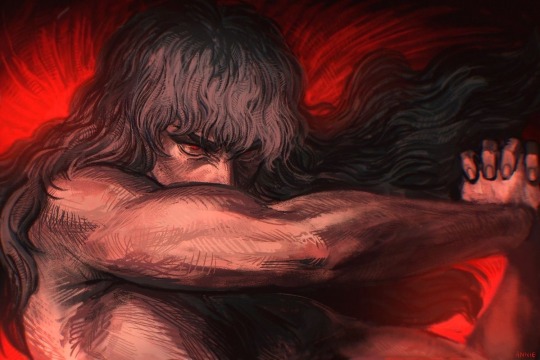

#griffith#berserk griffith#berserk#berserk analysis#griffith analysis#character analysis#griffith berserk#the fallen angel#griffith fallen angel#griffith art#obsession#unhealthy obsession#machiavellianism#false heroism#false hero#delusion#responsibility#dilemma
31 notes
·
View notes
Text
Im lazy to color it so


26 notes
·
View notes
Text
9 notes
·
View notes
Text
weird little dude

#mario 85#mario85#mario 85 pc port#mario pc port#mx mario#mx#the false hero#false hero#i am not manually texturing the ground lmao#creepypasta#creepypasta game
4 notes
·
View notes
Text

8 notes
·
View notes
Text
#fairytales#fairy tales#fairytale#poll#fairytale poll#fairytales poll#princess#prince#king#queen#knight#damsel in distress#dude in distress#gentleman in jeopardy#hunter#archer#rule of three#the donor#the snitch#the town snitch#false hero#naive adventurer#fairytale characters#fairytale princess#fairytale prince#prince charming#writing#fairytale fantasy#fairytaleliving#fairy tale retelling
8 notes
·
View notes
Text
The end of 2024 has proven that 2025 seems to be a huge year for donghua and I’m gripping everyone to give all these donghua besides just the most popular ones a chance!!!:
youtube
Link Click, Yingdu arc: releasing December 27, 2024
youtube
Nezha 2, sequel to Nezha 2019 aka Nezha zhi motong jiangshi, confirmed for January 2025
youtube
To Be Hero X, likely April 2025 release (I hope people will also support the version with Chinese VAs! 🙏)
youtube
Lord of the Mysteries, 2025 summer release—accompanied by more good news: the novel has officially entered the British Library and it will also be translated into English by Yen Press
youtube
False Memory, series version, confirmed 2025 release
I am making this post because False Memory just released its new trailer and I am very much so looking forward to it! The series started as an indie short before growing into a bigger thing, much like Fog Hill of Five Elements and The Legend of Luo Xiaohei and Alita’s Trial. We’ve thus been waiting a couple years for news so this is really exciting, especially after it recently got a Twitter account!!
Bonuses:
youtube
Ya She, released a couple months ago but late enough into 2024 I’d still love for more people to check it out!
youtube
Scissor Seven, another one that’s had its newest season out for a while now, but I assume that for those who have Netflix, it hasn’t been officially English subbed or dubbed yet. We’re also still getting trailers for its game!:
youtube
youtube
I Am What I Am 2, released Dec 14, 2024 in China!
youtube
Reminder that Mo Dao Zu Shi is now on Crunchyroll! They may have removed it from Tencent’s donghua YouTube channel for this, so definitely go support it if you do have Crunchyroll!
Some children’s donghua have also recently released, including news of the new Balala the Fairies season and the other magical girls show, Rainbow Crew! The latter is confirmed for an official release in English.
The Yi Ren Zhi Xia game is also coming soon to global, and Fox Spirit Matchmaker even updated their OP recently after quite a long time of silence.
And speaking of silence, even the long-awaited SVSSS donghua saw some movement recently!?
Now if I could get a confirmed 2025 release for White Cat Legend season 3 (and maybe God Troubles Me and Lie Huo Jiao Chou and Fei Ren Zai and All Saints Street and The Legend of Luo Xiaohei and Wo Jia Dashixiong Naozi You Keng etc…)), I could die a happy man (gender-neutral)—after watching all of these newly released donghua shows and films and seasons, of course ahaha. 🙏
For more news and info on donghua, you can check here:
There’s a bunch of new donghua information in the above document that came from 2024, even though they don’t have official release dates yet! Including but not limited to:
The announcement and PV of Call-Up Girls, based on a baihe manhua
The announcement of a Nirvana in Fire donghua, based on the danmei novel with a famous cdrama adaptation (with the manhua having recently gotten an official English license via Aloha Comics)
Trailer and announcement for 《向火而生》, based on Shui Qian Cheng’s danmei novel Blazing Armour
More announcements for Jing Wei Qing Shang, based on the popular baihe novel
Trailer for The Story of Rong Song, a spin-off of the famous Big Fish and Begonia movie
and many, many more…!
Hope everyone can join me in watching more donghua for 2025!! :D
#Youtube#donghua#anime#<- I always kind of hate doing this but…for the exposure… *clenches fist*#animation#indie animation#chinese animation#manhua#kuku88#kuku rambles#link click#nezha#nezha zhi motong jiangshi#to be hero x#lord of the mysteries#lord of mysteries#false memory#ya she#scissor seven#I am what I am#mo dao zu shi#balala the fairies#yi ren zhi xia#fox spirit matchmaker#call-up girls#nirvana in fire#blazing armour#188男团#jing wei qing shang#big fish and begonia
452 notes
·
View notes
Text
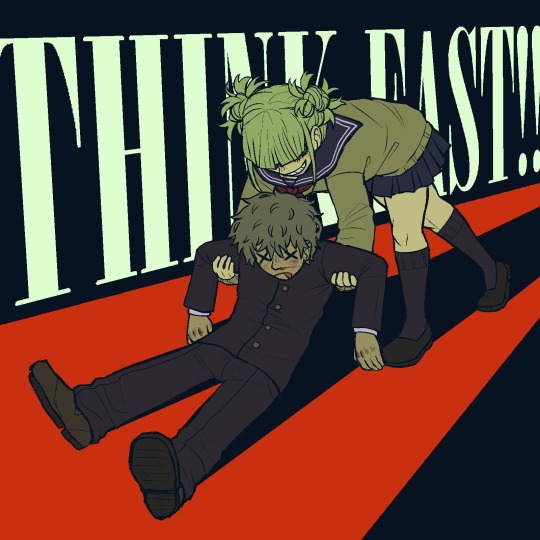

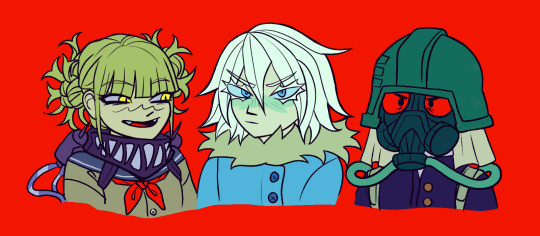
villain kids!!
#i need them all to be bffs so baddd#in my head its toga (17) mustard (15) and geten (19)#actually thats the exact same age gaps as me and my siblings but lets ignore that!!!!#why do does toga gotta be dead and mustard incarcerated and geten personalityless#thats actually so false i could write an essay about that kid#bnha#mha#bnha fanart#my hero academia#toga himiko#toga#geten#geten himura#bnha geten#mustard mha#league of villains#my artwork
1K notes
·
View notes
Text
False Hero AU


@rovobeam everything you've been drawing for this hurts my soul and I love it.
SO! 👏 The False Hero AU is all about what would have happened if Macaque won the fight with Wukong on the journey. After sealing Sun Wukong under Flower Fruit Mountain, Macaque continued to impersonate him for a while, travelling with the pilgrims until… well, until the journey ended prematurely. Once he no longer had to deal with that, Macaque was free to do just… whatever he wanted. However, with the Monkey King gone, the world was still in need of a hero.
It wasn't like Macaque planned this all from the start. He saved some villages because, well, he was just in the area. As he did tho, he started to be seen as more and more of a hero. People didn't have to worry about the old Monkey King coming to save them anymore, not when this new one was doing so well!
The attention and praise eventually got to his head, and Macaque began to embrace the role he'd been given. He liked being a hero, having all these people admire him. Wukong abandoned him to join those stupid monks, but now? He had the love of the people Wukong used to protect. Of course, he didn't want all this attention and praise to waiver if anyone thought to look back on what really happened during the journey. Nobody even knew what happened to Sun Wukong after the other pilgrims died, which left Macaque to shape the story and tell the tale of what happened himself.
By the time the modern age hits, everyone that heard of the Journey to the West knows about how the hero Six-Eared Macaque bravely defeated the rampaging Sun Wukong, the Corrupt Sage who thought he was equal to heaven. In this world, it's Macaque who becomes MK's mentor. Unlike Wukong tho, he is a much more active presence in the city, acting as its guardian and local hero instead of going into retirement.

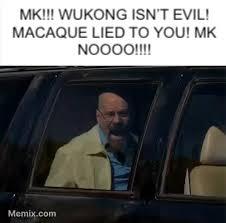
Everything was going well for him! He's beloved by the city he protects, he's surrounded by friends that love and care about him, and he loved them just as much. Sure, he sometimes had to make sure people didn't catch on to the real story, there was still the rare individual that would question the facts– but there was nothing to prove his version of events were false. He even keeps his scar visible so the world can remember what Wukong did to him in their fight. There was nothing to make the majority of people question him, anyway.
…That is, until MK finds the seal keeping Sun Wukong under Flower Fruit Mountain.
It's not like Macaque told the kid about the monster under the mountain, how could he have known not to touch it? Macaque may have been angry, but he wouldn't hold it against his student. However, this newly freed Wukong posed a very big threat. No matter who got in his way, whatever attempts Wukong makes to tell the world otherwise, Macaque would have to make sure his status as the real hero remained intact. This would result in many battles between the two mystic monkeys, and with MK by his side, he often came out on top. Macaque just had to keep painting Wukong as the villain, a demon returning to lay waste to their home. He'd do anything to ensure his version of history was the right one.
And Macaque refuses to let anyone stand in his way.

#i'll get into the ocs in my next post#wukong needs a hug#and a shower#false hero au#lego monkie kid#lmk sun wukong#lmk macaque#lmk mk#lmk au
301 notes
·
View notes
Text


but my heart is like a claw machine
#undescribed#bonk.png#great god grove#ggg#great god grove spoilers#ggg spoilers#isttvg spoilers#she/her for hector on this post please n thank you#i had a bunch of tags attempting to explain this whole thing n post game transfem hector hc but the og post didnt show up in the tags#n its like 5:30 something n i was already having trouble explaining it bc ive had like four hours of sleep so i sadly cant talk about gender#stuff like i wanted to in full detail so something something sanding self down to be nonthreatening n palatable#something something the way players (myself included) falsely believed king was a man despite many of us being trans or otherwise queer#n pre endgame king only being referred to with they/them something something men as the default as problem solvers as leaders the heroes of#the story something something hector's envy of the way king is loved n admired n able to be heard as herself#hector's fear of death n irrelevance driving her to do the shit she did n the main theme of isttvg (aside from transgenderism) being fear of#death n how denying yourself will cause you to become irrelevant in ur own life disconnected from everything as the years fly by#theres still time.#enjoy the bullet points its almost six am im gonna pass out#wiat also fixation on youth in both how we view n associate feminity n what is normally explored n portrayed with transgendering
181 notes
·
View notes
Text

Aoba and Lonk (False hero)
28 notes
·
View notes
Text
Why Sephiroth was Never a Good Person or a Hero
I think it's one thing to recognise the fact that he is a tragic character and, before Nibelheim, was as 'nice' as he could've turned out considering his circumstances (especially when compared to someone with a similar background like Homelander). But it's a whole other topic when I see people referring to him as an actively good person, let alone a hero.
Remember- he was a WEAPON. Yes, he looked out for his comrades, yes, he absolutely has a lot of vulnerable layers to him and was a victim of Shinra groomed into becoming what he did. But he's also someone who was killing innocent people long before Nibelheim, even a key player in genocide (Rhadore) and colonialism (Wutai). He killed children without mercy, because that was what he had been trained to do. I think part of the tragedy is that Sephiroth never had the chance to be a good person- the potential was there, that's without a doubt, but he never actually was one.
He's effectively a biological weapon raised by and leashed to Shinra. He never really had a choice in what he was going to be. Regardless, no truly good person kills innocent people, or takes part in fucking GENOCIDE- I think that is a very basic thing we can all agree on. Especially since he wasn't killing for some greater good, or even because he was convinced Shinra was right- it was simply because that was how he was raised.
I consider this one of my pet peeves because it almost feels like a woobification of the character. The tragedy of Sephiroth is NOT that he was a real hero who fell from grace, it's that he was never given a chance to be anything more than a killing machine or a tool for Shinra. It's just that, instead of killing the innocents that Shinra orders him to attack, Sephiroth has grown more obedient to his rage than the company that created him. The 'personality shift' in Nibelheim was not a shift at all. He was simply doing what he'd been raised to do, because how else was a living weapon like him going to express his rage if not acting like a living weapon?
Note 1: And no, 'he was just following orders' is not an excuse, just an explanation. Nor does it suddenly turn him into a good person. Vash the Stampede is one of the best examples of a fictional character that tries to encompass what it means to be good imo, someone who refrains from taking life wherever possible. Sephiroth was raised to take it and never managed to overcome or defy that.
Note 2: The devs trying to argue that the 'white feathers represent Sephiroth's purity' in the First Soldier is also incredibly tone-deaf, considering that he's about to be unleashed upon people defending their homeland and that his innocence was taken long before Rhadore. I'd argue it would've been whenever Shinra decided to train him into a living weapon, not when they're already releasing him to effectively commit a genocide and have already mentally prepared him to do so without hesitation. The devs have consistently made so many tone-deaf statements and decisions throughout the compilation (like Barret, THE FUCKING ENVIRONMENTALIST OF THE GROUP, starts encouraging oil use? IN THE GAME THAT'S A FUCKING ALLEGORY FOR ENVIRONMENTAL DESTRUCTION AND NON-RENEWABLE RESOURCES????) that it's convinced me that OG FF7 was only as good as it was by complete accident.
#this isn't my first time debating the lacking morality in a fictional character with long white/silver hair!#sometimes I wonder if people speak of him as a hero/good person because he's hot despite it being demonstrably false in the narrative#if you disagree with my thoughts please do so respectfully#and if I see any of you vagueposting... I will look for you... I will find you... and I will make a Liam Neeson Taken reference#Sephiroth#Final Fantasy VII#rambles#analysis#essay#sephcanons#Sephiroth pet peeve
124 notes
·
View notes
Text

this is a sweet moment from leo but I have no idea why he thinks this line. it's not true. like in every way it is not true. he's either known piper exactly as long as he's known jason or he's known piper four months longer than jason if we operate under the assumption that leo and piper were always friends and knew each other at school regardless of hera's memory tampering (a matter which is left somewhat ambiguous in the books, but I personally consider likely). it's kind of a weird take that lowkey downplays the leo&piper friendship and the only way I can think to explain it is if leo is still holding on to false memories of jason at the wilderness school
this is one of several reasons why I don't love how the jason&leo friendship is developed throughout hoo. at least piper is shown seriously grappling with the fact that her memories of jason are false and evaluating the idealized image she has of him in her mind versus the "real" jason she's getting to know. that's a really important thing for her to be doing! but leo is almost never shown pondering the falsity of his memories of jason. and honestly considering the fact that leo is characterized as a guy who actively avoids thinking about painful things in order to keep himself from breaking down, this writing has the inadvertent effect of making it seem like maybe leo doesn't think about it because he just doesn't want to. and I don't think I have to say why that isn't a good way to manage one's complicated interpersonal relationships
but I think the real reason why leo isn't shown dwelling on this much is simply because romances and friendships are not regarded as matters of equal importance in rick's writing lol. rick spends more time addressing this major conflict in jason/piper's romance because he just doesn't think it matters as much that leo, a guy who grew up without any friends, is now faced with the reality that his best friend is not who he thought he was. amnesia plots are fun and the material with the lost trio is so fascinating but god I do not care for how rick went about resolving all of these intermingling complications in their dynamics that started in tlh
#arguably leo has even known annabeth as long as he's known jason. they're not besties like that (he's afraid of her) but again#the highlighted line is just false#I swear there's a line in tlh where leo is literally like “fake memories? eh whatever” but I can't find it. did I make that up. am I the#one with fake memories now. damn#this is book criticism btw not me insulting leo or jason or their friendship or whatever else. like this is a writing flaw#rr crit#heroes of olympus#jason grace#pjo#baye.txt#leo valdez
108 notes
·
View notes
Text
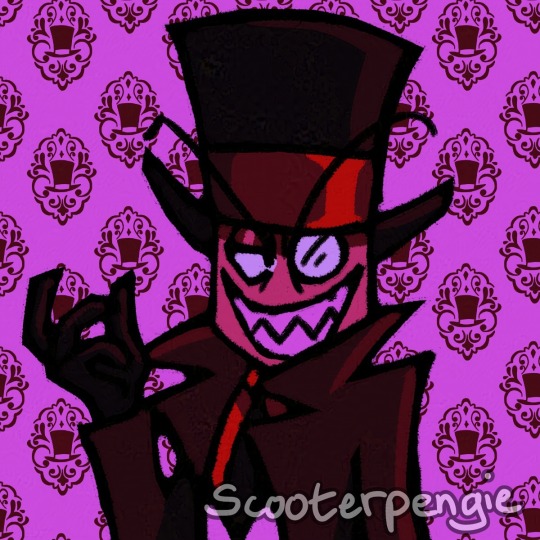
Saw this colour palette and instantly thought of Black Hat, plus it's been a while since I drew him.
I meant to post this on Alan's birthday but I forgot so instead I'm gonna use it as an excuse to rant about Black Hat again
I think it would be really interesting if Black Hat had a more black and white view of evil. Like if the heroes aren't actually good people, then why would Black Hat even care about defeating them? Surely he'd want to encourage any evil behaviour, regardless of who it's coming from? Unless Black Hat doesn't actually care whether or not he defeats the heroes but only wants to profit from lesser villains? Idk what do you guys think? Ik he's supposed to be really mysterious but I wish the writing was a bit clearer with this
#Villainous#villanos#black hat#Villainous black hat#Villainous fanart#my art#like it just seems strange to me that bh wouldn't be able to see past the “hero” label when it's so clearly false#like miss heed is arguably better at being evil than flug and dem#i think what it comes down to is#i have a very different perception of black hat to most other people in the fandom#and maybe even the show#i need to know if anyone actually thinks the same as me#or if I'm completely just in the wrong
51 notes
·
View notes
Text
Creature!Batfam with Human!Tim
I've read a to of pics where Tim is secretly a dragon, or a demon, or something and sometimes hides his species status.
From this idea, I propose to you: Human!Tim while the rest of the vigilantes are all non-human, even Bruce.
imagine the drama!
All the research Tim would have to do on different demonic/magical/etc species to pick one and to be able to pass off as one to others who actually are in a position to be able to tell.
What kind of creature could he hides himself as? How could he pull it off?
Does he befriend magic users who help him hide the fact he is purely human from the other's super senses? Does befriend an alien or a creature of the type he choses to impersonate or a similar species who helps him? Does he find grimors and use them in order to make his play believable?
#batfamily#tim drake#fanfiction#batman#dc#creature AU#are the batfam demons (mostly)?#or are they something else?#griffens?#fea?#sirens?#mystics of some sort?#what all would Tim have to do to hide his humanity?#How would the batfam discover his blood status?#How can he hide that he has the blood of a human?#How long do you think it would take Tim to train himself into inhuman reactions to things?#I don't think it would take him long because he is the king of false IDs#but like imagine#a tiny little Tim#learning that neither of his heroes are human#and then decides he wants to understand them#so he learns about the different secret species#and picks one to mimic#for funsies#you know?#except it winds up being something that “lets him” become Robin#because there is no way Batman would let a *human* of all things take up the role of Robin#right?#(wrong!)#I'm looking forward to reading any comments/reposts
68 notes
·
View notes